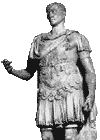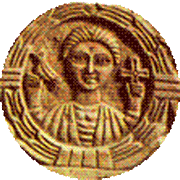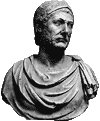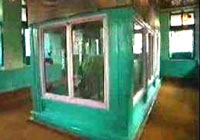
Divus Iulius!
A Real JC
Julius Caesar – man from 100-44 BC, god thereafter.
100 years before the supposed birth of Jesus another god-man was born: Gaius Julius Caesar.
Murdered at the height of his power, Caesar was elevated to a God after his death.
The Jesus Seminar
The Incredible Disappearing Messiah
Meeting for the first time in March 1985, the Jesus Seminar has periodically brought together dozens of university scholars and gospel specialists representing every shade of Christian thought, plus a few Jews and atheists.In their initial study, the scholars collected more than 1500 versions of approximately 500 Jesus parables, aphorisms, dialogues, and stories written during the first 300 years of Christianity.
After 6 years of debate and reflection the consensus was that 82% of the words attributed to Jesus were fake.
In phase two, between 1991 and 1996, the Jesus Seminar considered 387 versions of 176 'Jesus events'. Their conclusion: 84% of the activities attributed to Jesus were bogus.
In contrast, Caesar's words and deeds are fully documented by multiple witnesses.
Extant Letters –
From Caesar to Balbus; to Oppius; to Cicero.
From Cicero to Caesar; to Basilius; to Atticus; to Matius; to members of Cicero's own family.
From Sallust to Caesar.
July 13, 100 BC. Caesar is born in Rome to the wife of a praetor, one of the city's six chief law officers.
87 At the age of 13 Caesar is made a priest of Jupiter (flamen dialis). His father dies 2 years later.
84 Caesar marries Cornelia, daughter of Cornelius Cinna, a former consul and ally of Gaius Marius, leader of the populares (the people's party). Cornelia is the mother of his only legitimate child Julia.
81 Arrested at 19 and under the suspicion of the dictator Lucius Sulla, leader of the optimates (the senatorial party), Caesar flees Rome and joins the army.
80-78 Caesar is a staff officer in Asia. Gossip suggests a homosexual relationship with Nicomedes, the king of Bithynia.
75 Caesar is captured by Cilician pirates and held for 38 days. On release, he returns in force and crucifies them.
73 Elected pontifex, senior state priest.
69 Caesar's wife Cornelia dies.
67 Marries Pompeia, granddaughter of dictator Sulla.
65 Elected Aedile, one of 4 supervisors of temples, markets, festivals and games.
63 At the age of 37 Caesar bribes his way into the elected office of Pontifex Maximus (chief priest) and gains an official residence in Rome.
Julius Caesar as Pontifex Maximus on denarius from 63 BC. He wears the priest's hood.
62 Caesar divorces Pompeia in a scandal concerning the violation of the secret rites of Bona Dea.61 Caesar is appointed Governor of Further Spain with the rank of praetor. In Spain he discovers that war can be politically and financially very profitable.
Conquering Hero
Caesar as Imperator (general) and pater patriae (father of his country).
60 Caesar joins Pompey and Crassus in the first Triumvirate and institutes land and tax reforms. His daughter Julia marries Pompey.
59 Caesar becomes consul. He marries Calpurnia of the powerful Piso family. He subsequently gains the governorship of Cisalpine and Transalpine Gaul and Illyricum and command of 4 legions.
58-51 Caesar wages war in Gaul and defeats Vercingetorix. Caesar crosses the Rhine and defeats German tribes.
Caesar's own account of this war, De Bello Gallico, still survives.
55-54 Caesar invades Britain.
54 Julia, daughter of Caesar and wife of Pompey dies, breaking the personal alliance between the two men.
53 Crassus is killed on the Persian front, thus ending the Triumvirate.
52 Clodius, implicated with Caesar's ex-wife Pompeia 10 years earlier, is murdered.
50 The senate majority, led by Cato and the 'Optimates', accuse Caesar of treason.
49 Caesar crosses the Rubicon, provoking civil war between himself and Pompey.
Caesar's own account of this war also survives: De Bello Civili.
48 Pompey is defeated at Pharsalus and is murdered in Egypt. Caesar has liaison with Cleopatra and pacifies Pontus ("Veni, vidi, vici”). Returning to Rome, his Dictatorship is established but he pardons all his enemies.
45 Final defeat of Pompey's sons in Africa and Spain. Caesar is declared dictator for life and begins reforms.
44 Ides of March. Caesar is assassinated. Antony delivers eulogy at Caesar’s funeral.
"Of what avail, O Caesar, was your humanity, of what avail your inviolability, of what avail the laws? Nay, though you enacted many laws that men might not be killed by their personal foes, yet how mercilessly you yourself were slain by your friends!"
Antony in mourning on coinage.
July 44. At Caesar's funeral games a great comet appears in the sky for 7 days – a clear sign of Caesar’s ascendancy to heaven.
Antony shares a denarius with the dead Caesar
January 42. The Senate names Caesar 'Divus Julius' (Divine Julius), officially confirming him as a god of the Roman people.
44-29. Octavian, Caesar's adopted son (aka Augustus) avenges Caesar's death and murders Caesar's son by Cleopatra, Ptolemy Caesarion.
The life of Caesar, Roman statesman and conqueror, may itself have inspired aspects of the Christ myth.
* Be careful – If you try hard enough you could find 12 things in common between any two figures. Caesar wore sandals, Jesus wore sandals ...
The Rubicon Analogy
Richard Carrier compares Caesar's crossing of the Rubicon with the Resurrection yarn.
Unlike the
mythical Jesus Christ, we know what Caesar looked like and we
have a complete history of his life. In turn, general, orator,
historian, statesman and lawgiver. We
have words written by Caesar himself and words written by both
his friends and his enemies. Artifacts confirm his life and death,
as do his successors. Caesar established a style of government – and
a calendar – which endured for centuries. Evidence that confirms the existence of Caesar is legion – in stark contrast to the utter dearth of evidence for Jesus!
Caeasar: Images from his own lifetime
Contemporary images of Jesus? Nothing! Not only was no "from life" image ever made of Jesus, there is not even one word describing the godman in the entire New Testament. The earliest Christian iconography was simply cribbed from traditional representations of the god Apollo. Over the centuries, the image of Jesus has been adapted and modified to reflect the tastes (and often the appearance) of earthly powers.
Fantasy Meets Reality
Let's remind ourselves: Jesus Christ The Legend did some pretty remarkable things. His 'ministry' was a pretty public affair. Many of his tricks were of no particular value (cursing a fig tree?); some would have had disastrous consequences for innocent third parties (remember that herd of 2000 suicidal pigs into which he cast demons? Surely that ruined somebody else's living?). But certainly, by such 'miracles' he convinced his disciples and the multitude that he was the Messiah, right? Turning a jug of water into wine may have been trivial but resurrecting oneself from death was no mean trick. But if we are to 'believe' that these stories relate real events what is to be our criteria for acceptance? On what basis should we accept any of this as 'fact' rather than fancy?
Caesar: In His Own Words – a great deal Caesar was an eyewitness to many of the events he describes in his commentaries. He wrote not for posterity but to have an immediate impact on the power players in Rome as he schemed to advance his own career. The elapsed time between the wars and Caesar's own writing was a matter of months or at most a few years. The works of Caesar (off-site)
Jesus: In His Own Words – Nothing In contrast, the elapsed time between the gospel reports and the supposed events that they describe is at least 40 years for 'Mark' and 60-70 years for the other three Gospels. And just who was witness to that fabulous nativity, 30-odd years before the grande finale? At the most generous understanding, 'Luke' and 'Matthew' were recording hearsay testimony a century after angels, shepherds and wise men went calling. The unembellished truth is that the gospel accounts were written by eyewitnesses to nothing but their own skills of fabrication. For good reason, based on spatial and temporal proximity alone, historians give more credence to Caesar's commentaries than to the gospels, no matter how prolifically they were copied.
Et tu Jesus? There is nothing intrinsically improbable in a radical 1st century rabbi called Jesus. And any figure who emerged as a sage or soothsayer in ancient Palestine is unlikely to have left much evidence of his existence. But whilst we might entertain, perhaps, a few epithets of reported wisdom from such a guru, it would remain extremely doubtful that any attributed words were actually spoken by him, whatever the claims made today for "oral transmission." Thus, for example, we can accept the report from Josephus (our only source) that a Jesus ben Ananias caused disquiet in Jerusalem with a non-stop doom-laden mantra of ‘woe to the city’ but suspect that Josephus is using poetic licence when he reports this particular Jesus as saying, "A voice from the east, a voice from the west, a voice from the four winds, a voice against Jerusalem and the holy house, a voice against the bridegrooms and the brides, and a voice against the whole people." (Josephus, Wars 6:3). Bearing in mind that ancient languages had no symbol for quotation marks and made no distinction between a verbatim account of someone's speech and an accurate paraphrase, Josephus may well be providing a close paraphrase. He was present in Jerusalem at the time (62AD) and wrote his history within about a decade of the event. Not only was Josephus an eyewitness to much of the drama he described but also had access to Roman imperial archives and military commentaries, the hupomnemata. Josephus can also be checked against archaeological data, and, notwithstanding the occasional exaggeration, what he writes is generally confirmed.
A Fake Witness As it happens, we have an inordinate amount of Jesus dialogue. Nothing particularly novel or unique is put into his mouth, though much of it is contradictory or obscure. None of it comes from a reliable source. The Gospel of Thomas (found
in a Coptic translation at Nag Hammadi and in Greek
fragments at Oxyrhynchus),
for example, presents 114 "secret" sayings of Jesus, many of
which are rephrased quotations from Jewish scripture and over
half resemble
dialogue which turns up in the New Testament.
Others are simply silly:
Regular Christians, of course, are not very happy with the "5th Gospel" and cast doubt on its "reliability." The sayings are not (yet?) embedded in narrative stories to give them a semblance of historical reality and no miracles are mentioned. "Fake teachings, invented by the Gnostics" is the cry. But does wrapping epithets of folk wisdom into a series of "incidents" and "encounters" – even with a miracle thrown in for good measure – make a fraud any less a fraud? Jesus supposedly spoke in Aramaic but the gospels were written in Greek. Literal translation from one language to another inevitably breaks down at numerous points. Not surprisingly the scholars of the Jesus Seminar dismissed more than eighty per cent of the godman's words as invention.
Who Says? Who would have noted anything "Jesus of Nazareth" said before he emerged as a bona fide spiritual leader? Yet Luke (2.48,49) quotes the godman at the age of 12 in the "temple incident". Ok, so let's grant that after her son made the big time Mary becomes the proud mum, full of anecdotes about her illustrious offspring ... Maybe she even reminisced about traipsing off to Bethlehem, even Egypt. But Mary isn't everywhere. Matthew 3 reports dialogue between the godman and John the Baptist (let alone a voice from heaven!) in the wilderness of Judaea. Only when the Baptist gets imprisoned does JC choose his disciples so they wouldn't have been present either. So where does this little story originate, other than in the fertile mind of the gospel writer? Ok, let's concede "unknown and unstated bystanders" run off to tell the tale ... In fact, we have to rely on such hearsay again and again: JC's night time chat with Nicodemus, his conversation with a Samaritan woman, when his disciples are off shopping, etc., etc. But we're still not out of the woods. On several occasions the gospel writers quite specifically report Jesus’ conversations when neither they nor any other humans were present. Who would have had the faintest idea of what Jesus said when he was on his own? For example, chapter 17 of the Gospel of John is entirely taken up with a monologue addressed by a solitary Jesus to God himself. Matthew (4.3,10) tells of JC in the wilderness and having conversations with Satan. Now how would Matthew know what was said? Are we to imagine Jesus reminisced, "Hey guys, one time I was in the wilderness for 40 days and 40 nights and guess who showed up ... ?" If we take this step we may as well dream up the whole nine yards ...
Fraud of Ages Does anyone stand to gain by maintaining a myth? But of course, a vast global industry of religion. Was this always the case? Why YES, unquestionably after Constantine made Christianity the State religion, but no less so in the preceding centuries. Indeed, priests, shamans, witchdoctors have lived on the backs of others since people started living in groups. Given this venal motive of the "religiously inclined", we would be wise to exercise caution before buying its product and accepting its claims.
The vast Medieval forgery industry is a matter of historical record – a contributory cause of the Reformation. Before the canon of holy books was finalized in the 5th century hundreds of fanciful Jesus stories existed. Rancorous Church Councils decided which were 'sacred' and which were 'pious romances.'
Absolutely. We are not talking of a mere carpenter but a worker of miracles. Setting aside the miasma of "Faith" we require rather more evidence for a miracle than a normal activity, not less.
Yet every purported evidence for Jesus turns out to be dubious or non-existent. This includes no contemporary record of Jesus; no evidence for Nazareth in the 1st century; tampered works of non-Christian writers to insert 'evidence'; testimony of early Christians who didn't believe in a human Jesus anyway; gospels which flatly contradict each other; myriad instances of 'Jesus stories' copied from earlier legends and other cultures; and so on and so on.
Sources:
Enlighten a friend e-mail this page
Copyright © 2005
by Kenneth Humphreys. |
||||||||||||||||||||||||||||||||||||||||||||||||||||||||||||||||||||||||||||






















